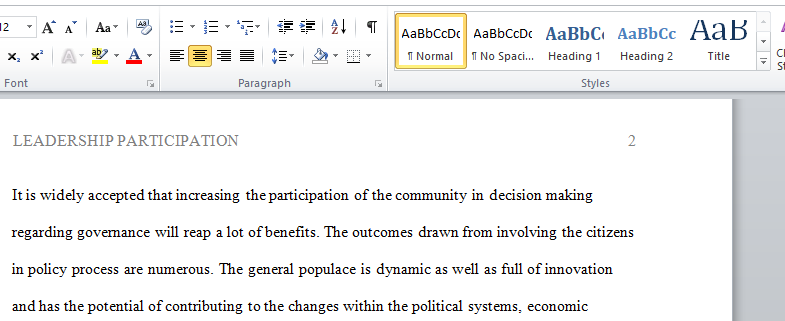Discuss dilemma surrounding leadership.
Answer the questions….
Paragraph 1
I found this week’s reading to be quite interesting.Discuss the dilemma surrounding leadership. The author describes this dilemma by discussing elite versus participationist approaches to leadership. Wren (2007) argues that the elitist view looks at democracy as a threat to leadership, whereas the participationist view looks at leadership to be a threat to democracy. He states, “American devotees of leadership have trusted the nation’s political salvation to the hands of a leadership elite, while treating followers as a secondary and inferior lot. Radical democrats have feared leadership as inherently destructive of democracy and have counted instead on the enthusiastic and capable efforts of leaderless equals” (Wren, 2007, p. 135).
The author further argues that both approaches have their virtues and their flaws. From the elitist camp, the argument that some people are more capable than others could be seen as valid, but “it takes no imagination for anyone living in the twenty-first century to realize the down side of relying upon individual leaders purportedly acting on our behalf” (Wren, 2007, p. 136). From the participationist standpoint, it sounds good, in theory, to give decision-making to the people; however, “the potential weakness in the participationist approach lies in the question of whether the people are willing and able – or can be fully trusted – to have sovereign authority in a democratic state” (Wren, 2007, p. 136).
This dilemma of elitist versus participationist view really made me consider my thoughts on political leadership, and everyday leadership in general. I have always felt like people should have a say in the decision-making process, but as I have gotten older I have found that when it comes to government, many do not take electing representatives seriously. Would we really want to trust the populace to be even more involved in the decision-making process? Additionally, when we talk about participationist approach to leadership, you also have to consider that if everyone has a completely equal say, the majority wins all the time. While that may not seem like something negative, I have previously given my stance on the fact that most people are only selfless as to it not hurting or hindering them in any way, so can we trust the majority to always consider the minority?
Answer preview:

Words:290
